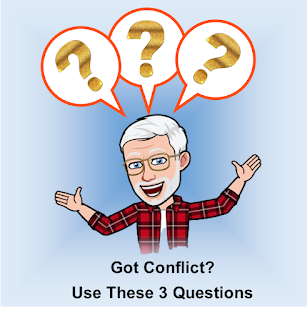Stuck in the Past?
Moving Forward When Identities Collide
We Are What We Think We Are
The way we see ourselves, our “identity,” can be a powerful force that shapes our cooperation behaviors. However, when different identities clash, they can become significant hurdles to building bridges between groups. This article explores strategies to succeed when you encounter this situation.
To navigate these complex situations effectively, here's a
list of strategies that anyone managing such conflicts can employ. Think of
this list as a menu of choices anyone can use to shift the focus toward a
shared future built on common ground and collaborative problem-solving.
Strategies for Harmonizing Different Identities
Foster Empathy and Understanding:
- Shared Narratives: Encourage the creation of a joint timeline of events, acknowledging and integrating the perspectives and experiences of both sides within the historical narrative. This helps build a more complete picture of the past and demonstrates how the groups are woven together.
- Humanize the "Other": Facilitate activities that explore the human stories and motivations behind the historical events. This fosters empathy for the experiences of the opposing group.
Focus on the Future:
- Shared Goals Workshop: Guide the parties to brainstorm shared goals for their future together. What kind of future do they envision for their children, their communities, and their society?
- Future-Oriented Storytelling: Encourage participants to create a collective vision for the future, one that builds upon the lessons of the past but isn't solely defined by it. And one that shows how the positive attributes of the different identities can combine to create that positive future.
Acknowledge Pain, but Promote Healing:
- Memorialization and Recognition: Facilitate discussions on ways to acknowledge and memorialize past injustices or suffering. This can promote a sense of closure and healing for both sides.
- Truth-Seeking Processes: Create a safe and respectful space for truth-telling as each person perceives it, allowing past narratives to be acknowledged without blame or retribution.
Celebrate Shared Values:
- Highlight Commonalities: Help the parties identify shared values and principles that can serve as a foundation for building trust and cooperation. When someone says they value something, ask why they value it. This almost always exposes another, more deeply held value that others in the room are likely to share.
- Focus on Shared Identity: Explore broader cultural and social identities that connect the groups, fostering a sense of belonging to a larger whole. There is great power in Martin Luther King’s famous quote, “We may have all come on different ships, but we are all in the same boat now.” Ask the diverse identities in the room to discuss how to sail this boat peacefully to a productive future that will work for everyone.
Model Collaborative Problem-Solving:
- Joint Projects: Design collaborative projects that address common challenges or needs. Working together on shared goals requires cooperation and a focus on the future for success.
- Facilitate Respectful Discussions: Set clear ground rules for respectful communication, ensuring everyone feels heard and valued throughout the process.
Additional Tips:
- Engage Experts: Involve historians, sociologists, local ‘culture custodians’, or other experts who can provide objective interpretations of historical events, facilitate a nuanced understanding, and encourage acceptance of diversity as a strength.
- Long-Term Commitment: Building trust and co-creating a new future takes time. Be prepared for a long-term commitment. Progress on identity reconciliation often is a go-slow-to-go-fast process.
If you want to go fast, go alone.If you want to go far, go together.
There is wisdom in this old African proverb. By employing these strategies, anyone can empower disputing groups to move beyond the limitations of their historical narratives. Fostering empathy, focusing on a shared future, acknowledging pain, celebrating shared values, and modeling collaborative problem-solving are all steps toward building bridges of mutual respect and understanding. With dedicated effort and the right approach, even seemingly intractable conflicts can be navigated toward a more peaceful and positive future.
Free Consultation - Just Ask!
I offer free consultations on conflict, facilitation, difficult meetings, public involvement, online meetings, and collaboration in general. Schedule an opportunity to talk with me about your issue. I promise to not trap you into a marketing message. We will stick to problem-solving on your issue. Click for Appointment
Contact Us:
Michael Fraidenburg
Olympia, WA, USA.
Email Mike







